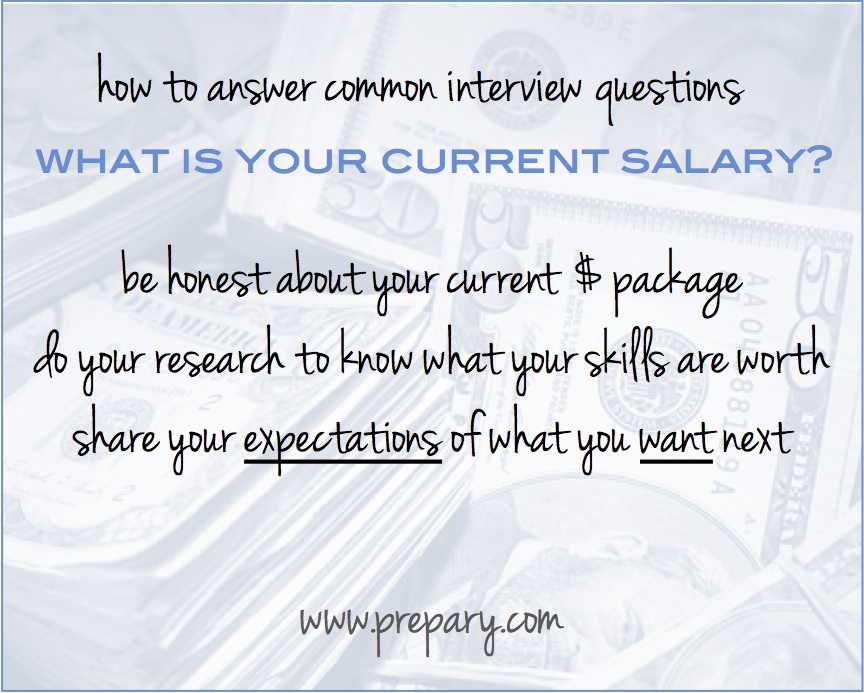Common interview question: “What is your current salary?”
Why they’re asking: They genuinely want to make sure the budget set for the role is not significantly lower than your current salary (basically, they know you probably aren’t going to want to take a pay cut)
Why it’s tricky to answer: You don’t want to accidentally “lowball” yourself but you also don’t want to seem “out of reach” and therefore not be considered for the role.
What I think: Just be HONEST about your current salary (and include all other pieces of your comp package) – but be sure to also discuss your salary expectations.

Now for some detail…
A recent question I answered on Quora got me thinking about this topic. Discussing salary history is a topic that will often come up in the interview process. Some recruiters will ask outright during the interview while others may gather this information using an application. Either way, prior to the offer, this information will need to be gathered… and that’s because your salary history does get incorporated into the offer package.
The main reason for this has good intentions – the company wants to make sure they are giving you a compelling offer relative to what you earning currently. However, knowing that this information gets incorporated into offer decisions has had negative consequences. Because people think it will lead to a higher offer, people sometimes lie about what they are currently making. It is unfortunate that this happens – and you may come across people who actually give you advice to lie and say you are making more than you are.
My advice to you is don’t lie about your salary history. Here’s why:
1. First of all, its dishonest (obviously) and shows a major lack of integrity. If you lie on an application (which is an official document) you could even be fired if the truth ever comes to light.
2. Some companies choose to verify this information (at different points in the process) by asking you for an offer letter or past pay stub (some type of proof). You never know when this is coming and you do not want to be in the position where you are unable to back up your claim later on in the process. This would definitely be grounds for not moving forward with your candidacy.
3. Even if a company doesn’t ask you to verify your salary, recruiters are often very immersed in “the market” for a given industry, level, or role. An experienced recruiter has worked across various companies and has hired tons of people into similar positions. If you get too creative, they will automatically know that what you put down is not in line with what they have seen hiring people with similar experience (at similar companies).
4. Another negative to being dishonest on this front is that you might “price yourself out” of the job. If you lie and say you are making 65k but the budget for the role is only 50k, the company may not move forward since it is unlikely you would accept an offer.
My personal recommendation…
Is to be 100% honest about your salary (read on… there is a catch). Make sure you are thinking about your overall package vs. just your base and give information on any other perks – bonuses, discounts, travel allowances, per diem, benefits, etc. For example, if the company you are at now provides a shuttle for you to get to work every day and your new one may not, your offer may have to be higher to make up for that. Being really clear is always the best for both parties.
Here is the catch…
While you must be honest about your prior earnings you also must be honest and upfront about your expectations. The formula in my mind for answering this question should be “I am currently earning $XX but based on X, Y, Z I’d like to be at a minimum of $XX if I make a move.” In order to intelligently speak to that you need to know your worth & know the market.
First of all, know how much your own skills are worth. Based on the qualifications and responsibilities of the job, are the skills they are asking for rare or very common? Does a project you’ve managed or a program you’ve learned make you “worth” more than you may have been when you started your last job. Of course, this is a little murky and tough to quantify, but it’s all about having the confidence to know what your skillset is worth in a particular market.
The second thing is (thanks to sites like Glassdoor.com) data is available to you. Go onto Glassdoor, or a similar site, and enter the title of the job you are interviewing for. Look for the company you are interviewing with (or their competitors, or both) and find out what people in similar roles are earning. Salary data is a lot more transparent now than it has been in the past. Keep in mind that the “high ends” of the salary ranges are not necessarily what you should be looking at since they can be outliers/special situations. Look at the averages and do your diligence. This will help you determine what is reasonable for a the type of job you are interviewing for.
Like so many other things in the job search process, research and diligence is going to give you a big leg up… so when talking about salaries dont lie, don’t undervalue yourself, and know what you are worth.






